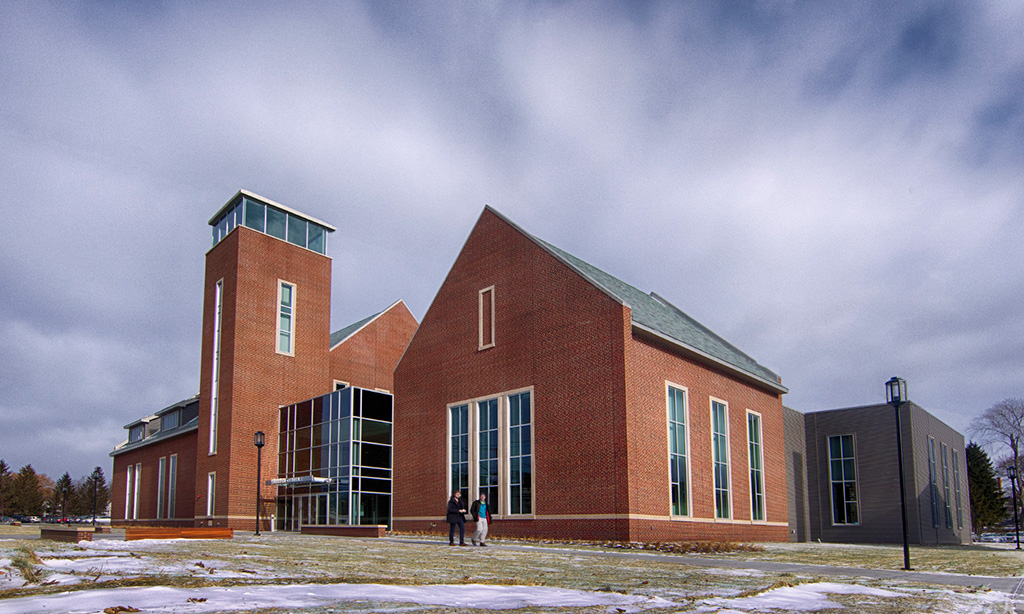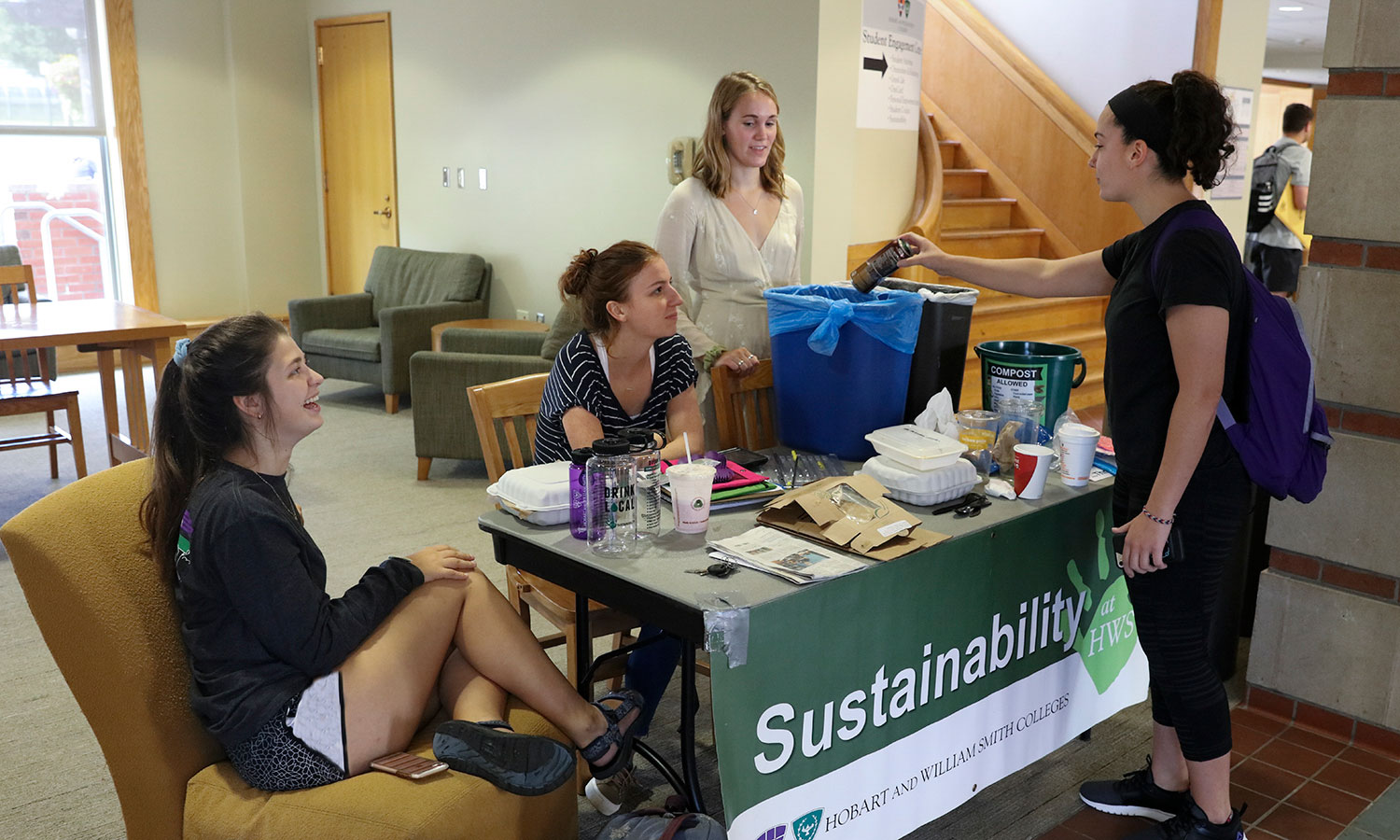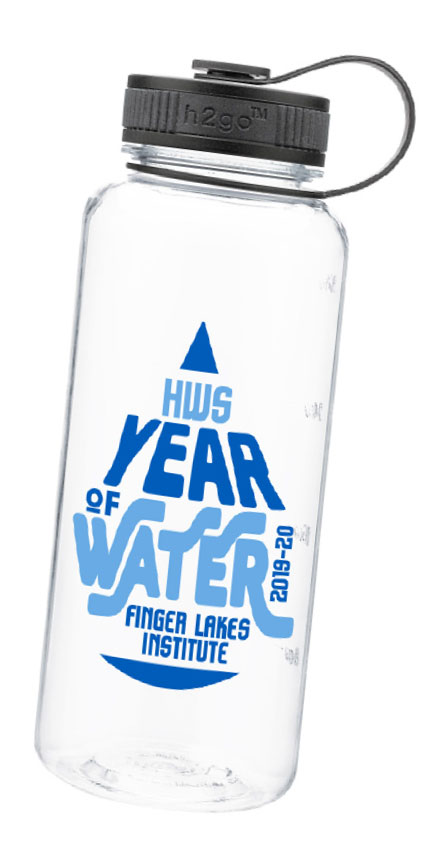Buildings
Energy
Food Systems
Open Spaces
Transportation
Waste Management
Water
SustainabilityProjects and Operations
CONTACT
If you have any questions or comments about sustainability initiatives at HWS please feel free to contact us at sustainability@hws.edu.

Buildings
Our Climate Action plan requires that all new buildings constructed on campus and any building undergoing significant renovations follow LEED (Leadership in Energy and Environmental) standards and protocols. The most recent building to be added to campus is the Gearan Center for the Performing Arts, which was able to get LEED Gold certification!
Cleaning Supplies
For wet floor cleaning, the Colleges use a chemical-free unit that cleans without the environmental and human health issues associated with producing, transporting, packaging, using, and disposing of harsh cleaning chemicals. The unit’s hygienic tanks allow for easy access and sanitation to reduce mold, bacteria, and other contaminants that can grow in enclosed tanks. Additionally, the floor cleaning machine uses 90% less detergent and 70% less water than conventional scrubbing.
For hand cleaning, the Colleges use a bio-degradable foam soap certified by EcoLogo and Green Seal. Green Seal is a non-governmental organization that sets environmental standards for products and works with applicants to certify their product under Green Seal environmental criteria.
Ongoing Efficiency Projects
- Light Emitting Diodes (LEDs) and Compact Fluorescent Lamps (CFLs) are more energy efficient that incandescent, fluorescent, metal halide and other types of more traditional bulbs. LEDs are considered for every lighting upgrade. Most exterior lighting has been replaced with LEDs or other energy efficient bulbs. Interior bulbs are continuously being replaced with more energy efficient bulbs across campus. In a recent 12-month time period, LEDs were installed in 578 emergency lights, 200 fixtures in student rooms, 25 exit lights, six parking lot pole lights, and 40 troffer style lights in the library archive.
- Variable Speed Drives are a type of adjustable-speed drive used in electro-mechanical drive systems to control motor speed and torque- reducing electricity use.
- Chillers are machines that remove heat from liquid, which can then be circulated through a heat exchanger to cool air or equipment as required. At HWS, few buildings on campus currently offer air conditioning via chillers, but two chillers have already been replaced with more energy efficient models.
- Boilers are units used for heating large spaces. At HWS, old, inefficient domestic hot water boilers are consistently being replaced with more energy efficient models
- Direct Digital Control (DDC) systems are used on campus to monitor and adjust heating and cooling to maximize energy conservation, occupant comfort, and proper system function.
- Nest Thermostats allow facilities staff to remotely monitor temperature in small houses around campus to maximize energy conservation, occupant comfort, and proper system function.
- CO2 Sensors allow for more accurate heating and cooling control and energy savings
Energy
We encourage all HWS students, faculty, and staff to help us save energy by their lifestyle choices! You might have noticed out Flip The Switch stickers as a reminder to turn off lights, computers, projectors, air conditions, and any other electronic when not in use. Washing laundry in cold water instead of hot reduces the energy needed by 90%! Avoid having multiple mini-fridges in a single bedroom or office suite. Lastly, be sure to report any broken thermostats or leaky windows to our facilities department for repair.
Solar Electricity
Hobart and William Smith Colleges generate electricity from two solar farms – together representing one of the largest solar installations at a higher education institution in New York State – that deliver 50 percent of the Colleges' electricity. Our first farm located on route 14 N went online in Nov of 2016. It was so successful, the next year we put our second solar farm online located on Gates road.
View our real-time solar generation!
Wind Electricity
Before our solar farms, Hobart and William Smith Colleges was powered by the wind. In 2012, the Colleges became the first small liberal arts college in New York to purchase 100 percent of its electricity from wind sources. Since that time, we have always only purchased wind-generated electricity for our needs. Since our solar farms only account for half of our electrical needs the remainder of our demand is met with wind electricity.
Geothermal
Geothermal heating and cooling systems work by moving heat, rather than by converting chemical energy to heat like in a furnace. The Finger Lakes Institute has 20 wells at approximately 100 feet deep that exchange the earth’s temperature to heat and cool the building. The US EPA has concluded that the geothermal heating and cooling system is one of the most favorable technologies to use in terms of operating efficiency and economics.
EPA Green Power Partnership
In 2011 HWS became an accredited EPA Green Power Partner. The Green Power Partnership is a voluntary program that encourages organizations to use green power as a way to reduce the environmental impacts associated with conventional electricity use. The Partnership currently has more than 1,700 Partner organizations voluntarily using billions of kilowatt-hours of green power annually.
You can find our profile on the EPA GPP here.
A recent project by Owen Speth ’21 also researched the amount of embodied energy in our solar panels and how long of operation it takes to payback the carbon generated in their construction.
Food Systems

Sodexo Dining Service
The Colleges have an external contract with Sodexo to provide dining and campus services. In April 2013, Sodexo announced their partnership and support for the Real Food Challenge to increase supply chain transparency for their contracted schools. Since then, Sodexo at HWS has contributed to our student utilization of the Real Food Challenge Calculator Tool and supported the staffing of a food assessment intern. Visit the Sodexo Dining Services website for more information.
Campus Food Procurement
Since 2012, Hobart and William Smith students have worked to recognize and support an institutional commitment to procurement of ‘real food’ – food that is local or community based, fair, ecologically sound, and/or humane. Through utilization of the Real Food Challenge Calculator Tool, our students have analyzed Sodexo Dining Service food receipts to calculate the percent ‘real food’ purchased by HWS.
HWS Food Week
During the week of National Food Day (October 24), HWS recognizes various components of our local, regional, national, and global food systems by inviting the campus and Geneva communities to learn and practice through lectures, study, film, presentation, service, experience, consumption, and demonstration. We continually seek food and farm vendors for our biannual HWS Farmers Market which takes place on the Friday of HWS Food Week (October) and HWS Earth Week (April).
Open Spaces

Student Garden
Derek Weiss ’12 created the campus garden in 2012 as a small-scale permaculture site that provides students with space and the opportunity to experiment with growing food and gardening within a community garden space.
ColdFrame Handbook by Derek Weis ’12
Hanley Preserve
Primarily overseen by the HWS Biology department, the Colleges’ 108-acre wildlife refuge close to nearby Cayuga Lake offers students an area for ecological studies. The preserve, located about 20 miles from campus, has over 40 ponds, a deciduous forest, cultivated fields, old fields, swamps, a stream, and numerous other habitats. The Richard Ryan Field Laboratory building was opened on the preserve in 1994, and provides a location for lecture and laboratory activities.
Historical and Interdisciplinary Linkages: Studying the Past and Present at Hanley Biological Field Preserve
The role of fish in shaping pond communities at Hanley Biological Field Preserve
Pollinators
Our students and campus community incorporates pollinator conservation and education in our land management, coursework, service learning, research, and community engagement. There are honeybee hives kept at HWS Fribolin Farm as well as land and no-mow areas set aside for native pollinators on campus. In 2019, HWS Fribolin Farm extended their reach by creating a perennial Pollinator Patch on main campus at 601 S. Main Street. The site, a former rain garden, contains various seeded and planted perennials that are preferred by, and attract, beneficial insects. In February 2019, HWS became a designated Bee Campus USA.
Urban Forestry
HWS became an Arbor Day Foundation Tree Campus USA in 2012. In honor of nurseryman and William Smith College founder William Smith, there are more than 1,800 established trees on campus from 42 genera and 73 species. HWS is committed to cultivating programs, policies, and initiatives revolving around tree conservation and sustainability. Through student, faculty, staff and community engagement, HWS leaders and Sodexo Grounds implement sustainable management of campus and community trees, promote the fostering of healthy urban forests, and educates the public on the importance of natural resource conservation. The Campus Tree Care Plan is updated every five years.
Transportation

Walking
HWS is a residential campus located close to downtown Geneva and other local amenities. From Scandling Center, you can walk almost anywhere you need in 10 minutes.
Yellow Bike
The Yellow Bike Program kicked off in the Fall 2008 Semester with a new Bike Shop, two bike shop managers, over 70 yellow bikes, and many new bike racks! The Yellow Bike program continues to be a success every year as students look for a low-impact mode of transportation in and around campus. There is a $60 cash deposit to get a bike and that includes the helmet (if available) and a chain/lock to secure the bike. You will need to bring cash and your student ID. You get the $60 back at the end of the semester when everything is returned. To find out more about the Yellow Bike program and how you can get one, email sustainability@hws.edu.
Charging Station
Anyone on campus is allowed to use our green and clean electricity and charge up their electric car for free! The station is located in the Medbery Parking lot next to Public Safety building and first installed in 2014. To meet growing demand, we recently installed two additional charging stations in the parking lot of Scandling behind the Intercultural Affairs house.
Shuttle
The HWS campus shuttle will bring you all over Geneva, whether you need to go to Wegmans, downtown for a quick bite, the gym, or even the movie theatre. Click here for campus shuttle pickup locations and times.
Green Surcharge Parking Tickets
There is a $15 Green Surcharge added to every campus parking ticket to encourage alternative transportation and decrease campus greenhouse gas (GHG) emissions associated with commuting. The money is used for campus sustainability and greenhouse gas (GHG) emissions reduction projects.
Waste Management

Recycling
For complete guide what should be put in the recycling bin click here. If you also want a list of what NOT to put in, click here. HWS is located in Ontario County NY, which operates a zero-sort recycling system. That means that all recyclables go into one blue bin, which are then sorted at the Materials Recovery Facility (MRF) located a few miles from campus on NYS Routes 5&20 in Stanley, NY.
Composting
All pre and post-consumer food scraps in the main dining hall Saga, The Pub, and The Cafe are collected by a local company, Natural Upcycling. They haul the organics to several different composting operations in upstate NY with the nearest one being Cayuga Compost, located in Trumansburg, NY, approximately 34 miles from campus.
HWS has recently made composting of organic waste at catered events more successful through signage, volunteers, and outreach. We hope these efforts not only decrease organic waste to landfills, but also raise awareness amongst faculty, students, staff, alum, parents, and other campus visitors.
Why: Organic waste is one of the primary contributors to methane production in landfills, which is a highly potent greenhouse gas. Landfills are the third largest source of methane emissions in the United States.
E-Waste
Old electronics from the campus can be brought to the IT HelpDesk in the Library anytime from 9am-4pm Monday-Friday! Every semester a local company based near Rochester, EWASTE+ will pick up the electronics and recycle all components in an environmentally friendly way. The list of acceptable material is below. If you have personal electronic waste from home, we have an annual collection the week after spring break.
| Batteries | Lab & medical electronics | Scanners |
| Cables & IT accessories | Laptops | Servers & server racks |
| Cameras | Mainframe/ Midrange | Stereo equipment |
| Computers | Monitors | Telecommunications Equipment |
| Computer peripherals (mice, keyboards, webcams, speakers, microphones) | Mobile devices (cell Phones, Tablets, PDAs, MP3 players) | Storage devices (external hard drives, solid state drives, SD cards, memory cards,) |
| Copiers | Networking Gear | Televisions (any kind!) |
| Electronics Scrap | Phone systems | Terminals |
| Fax Machines | Power supplies | Typewriters |
| Gaming devices | Routers & switches | Video & audio equipment |
| GPS units | Printers & plotters (ink, toner, & cartridges) | Wiring & Cabling |
Why: “Electronics are made from valuable resources, such as precious metals, copper, and engineered plastics, all of which require considerable energy to process and manufacture. Recycling electronics recovers valuable materials and as a result, we reduce greenhouse gas emissions, reduce pollution, save energy, and save resources by extracting fewer raw materials from the earth.”
Water

Water Filling Stations
We have over 20 water bottle refill stations that have been installed on campus. Water bottle refill stations ease access to cold, safe drinking water and encourage the use of reusable water bottles. Reusable water bottles greatly reduce the use and disposal of single use plastic water bottles. Our current list is below:
|
Bristol Gym |
Bristol Fieldhouse (4 stations) |
Buildings & Grounds |
Comstock |
|
deCordova |
Demarest Hall |
Durfee |
Finger Lakes Institute |
|
Gearan Center for the Performing Arts |
Gulick Hall, 2nd floor |
Hirshson |
Hale |
|
Library |
Merritt Hall |
Rees Hall |
Rosenberg Hall |
|
Scandling Student Center |
Sherrill |
Stern Hall |
Winn-Seeley |
Encouraging everyone to drink our healthy, clean tap water is helped by the Take Back The Tap campaign organized by the Food and Water Watch organization. We are working on getting Hobart and William Smith signed up and committed to stop the sale of bottled water on campus. You can often find us tabling in Scandling Student Center doing water taste tests and giving out free prizes!
Stormwater Management
- Green Roofs – The Colleges have installed two green roofs, one on a residential hall (Comstock Hall) one on the new Performing Arts Center (PAC). These projects were initiated by students and the Climate Task Force as a means to help with stormwater management, reduce heat island effect, extend the lifetime of the roof system, and improve energy efficiency through increased insulation value. The PAC green roof helps in achieving LEED accreditation.
- Rain Barrels – The Finger Lakes Institute's Store the Storm project has promoted rainwater harvesting techniques. Installing a rain barrel is an easy way to protect our environment and save money. A rain barrel collects and stores rainwater from your roof that would otherwise be lost to runoff and diverted to storm drains or streams. Rain barrels reduce the flow of untreated storm runoff into bodies of water, like the Finger Lakes. Installing a rain barrel will minimize runoff pollutants into our waterways, conserve treated drinking water, and reduce demand on the wastewater treatment system. Using a rain barrel not only helps protect the environment, it saves money and energy.
- Permeable Pavement – The Colleges have installed permeable pavement at the Finger Lakes Institute as a demonstration project. The permeable pavement was installed on the steep western slope of Seneca Lake, where it aides in the infiltration of rainwater running off nearby roads, sidewalks, driveway, and the hillside.
- Ponds – The Colleges have three retention ponds. Landscape strategies have been deployed to integrate the ponds into the aesthetic of the campus, create habitat for wildlife, and slow and clean run-off. Odell’s Pond, the largest of three detention ponds, is located in one of the lowest elevations of campus to collect stormwater from nearby roads, sidewalks, driveways, athletic playing surfaces, and other impermeable surfaces. Odell’s Pond serves as a temporary reservoir, allowing for stormwater to slowly flow into a nearby wetland. Odell’s Pond is part of a multi-step stormwater management system.
- Swales – The Colleges have a number of vegetated swales, many of the vegetated swales offer a first entry to storm water before it flows into a retention pond or down steep slopes surround the Finger Lakes.
- Storm Drains – In order to spread awareness about the local watershed and the impact of storm drains, the Finger Lakes Institute spearheaded a storm drain labeling project to mark 500 storm drains throughout the Geneva community with No Dumping signs.
Water Use Reduction Initiatives
- Appliances – Sodexo now uses new Ecolab Apexä dishwashing systems that use non-caustic chemistry, 95% less packaging material than prior methods, and saves approximately 22.4 million gallons of water annually, or about enough to fill 34 Olympic-sized pools.
- Fixtures – All major building renovations and new construction on campus utilize water efficient fixtures, including low flow toilets, faucets, and showerheads. For instance, new tank style toilet installations, as well as replacements or upgrades are low flow (1.3 gallons per flush) models (approximately 170). 80% of the remaining flushometer style toilets have been upgraded to low flow valves (1.6 gallons per flush). There are approximately 300 showers on campus. Most of the existing (95%) and any new showers utilize low flow (1.5 GPM) heads.
- Irrigation – For the few irrigation systems that HWS does operate, one includes a rain sensor. The other systems are scheduled using weather data and personal inspection of soil moisture. They are set to run based on weather information, projected use, and monitoring of conditions.
- Plantings – HWS landscape choices consider plants that do not require irrigation, can tolerate the conditions of our climate, and are appropriate for soil type. Native species are used as often as possible.

